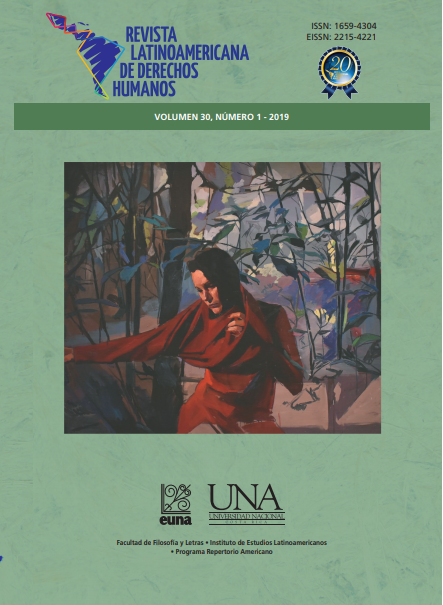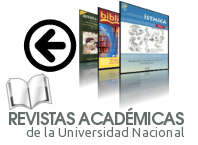SIGNIFICATIONS FROM YOUNG UNIVERSITY STUDENTS ABOUT HUMAN RIGHTS
DOI:
https://doi.org/10.15359/rldh.30-1.4Keywords:
Education, Human Rights, Pedagogical practices, Educational management, Social justice and inclusion, Cognitive variable, Affective-behavioral variable, Contextual variableAbstract
This article gives an account of the main results of an investigation about meanings attributed by a group of university students to human rights in Chile. Among the results, it is possible to advance that young people express a favorable position with respect to some principles related to human rights, such as freedom of belief, equality and respect for diversity, the role of the State as guarantor of rights, among others. Along with this, new elements are incorporated into the discussion, based on three central categories that cross similar research at the international level, which can be grouped into: pedagogical practices, educational management, social justice and inclusion. In each of them, in turn, reference will be made to three intervening variables in human rights education: cognitive, affective-behavioral and contextual.
References
Anderson, L. W., Krathwohl, D. R., Airasian, P., Cruikshank, K., Mayer, R., Pintrich, P. y Wittrock, M. (eds.). (2001). A taxonomy for learning, teaching and assessing: A revision of Bloom’s taxonomy. New York: Longman Publishing.
Asghar, M. y Rowe, N. (2017). Reciprocity and critical reflection as the key to social justice in service learning: A case study. Innovations in Education and Teaching International, 54(2), 117-125.
https://doi.org/10.1080/14703297.2016.1273788
Boevé, A. J., Meijer, R. R., Bosker, R. J., Vugteveen, J., Hoekstra, R. y Albers, C. J. (2017). Implementing the flipped classroom: an exploration of study behaviour and student performance. Higher Education, 74(6), 1015-1032. https://doi.org/10.1007/s10734-016-0104-y
Cátedra Unesco de Educación en Derechos Humanos Harald Edelstam. (2017). Significaciones que otorgan a los Derechos Humanos los estudiantes de primer año de la Universidad Academia de Humanismo Cristiano, ingreso 2016: una contribución a las políticas educativas de esta casa de estudios. Santiago de Chile: Unesco / Universidad Academia de Humanismo Cristiano.
Correa, A., Álvarez, A. y Correa, S. (2009). La Gestión educativa un nuevo paradigma. Colombia: Fundación Universitaria Luis Amigo. Recuperado de http://virtual.funlam.edu.co/repositorio/sites/default/files/6lagestioneducativaunnuevoparadigma.pdf
Ekman, J. y Amnå, E. (2012). Political participation and civic engagement: Towards a new typology. Human affairs, 22(3), 283-300. https://doi.org/10.2478/s13374-012-
Gerónimo-Tello, C. (2016). Gestionar la escuela en Latinoamérica. Gestión educativa, realidad y política. Revista Paraguaya de Educación, 1(45), s. p
Gregorcic, B., Etkina, E. y Planinsic, G. (2017). A New Way of Using the Interactive Whiteboard in a High School Physics Classroom: A Case Study. Research in Science Education 481-25. https://doi.org/10.1007/s1116
https://doi.org/10.1007/s11165-016-9576-0
Ibañez, J. (1979). Más allá de la sociología. Madrid: Siglo XXI.
Ibañez, J. (1998). El regreso del sujeto: La investigación social de segundo orden. Madrid: Siglo XXI
Labraña, C. M., Lara, N. V. y Jedlicki, L. R. (2010). Percepción del estudiantado de enseñanza básica sobre el rol del estado, las instituciones públicas, la democracia, la ciudadanía y los derechos de las mujeres y de los inmigrantes. Estudios Pedagógicos, 36(2), 153-175. https://doi.org/10.4067/S0718-07052010000200009
Lehesvuori, S., Ramnarain, U. y Viiri, J. (2017). Challenging Transmission Modes of Teaching in Science Classrooms: Enhancing Learner-Centredness through Dialogicity. Research in Science Education, 48 (5),1-21. doi:10.1007/s11165-016-9598-7
https://doi.org/10.1007/s11165-016-9598-7
Molano, A. D. R. (2016). La gestión educativa: Hacia la optimización de la formación docente en la educación superior en Colombia. Sophia, 12(1), 55-70. https://doi.org/10.18634/sophiaj.12v.1i.445
Money, A. y Coughlan, J. (2016). Team-taught versus individually taught undergraduate education: a qualitative study of student experiences and preferences. Higher Education, 72(6), 797-811.
https://doi.org/10.1007/s10734-015-9976-5
Morales-Fernández, E. J., Ariza-Montes, A. y Morales-Gutiérrez, A. C. (2013). La evolución de la gestión de recursos humanos desde una perspectiva estratégica. Revista de Fomento Social, 271, 309-329
Morón, A. A. (2013). Igualdad y Libertad: Fundamentos de la Justicia Social. Revista Internacional de Educación para la Justicia Social, 2(1), 173-194.
Muñoz, C., Vásquez, N. y Sánchez, M. (2013). Percepciones del estudiantado sobre la democracia y los derechos humanos al finalizar la Educación General Básica: Un estudio desde las aulas de Historia. Psicoperspectivas, 12(1), 97-117. https://doi.org/10.5027/psicoperspectivas-Vol12-Issue1-fulltext-230
Naciones Unidas. (1948). Declaración Universal de los Derechos Humanos. Recuperado de http://www.un.org/es/universal-declaration-human-rights/
Naciones Unidas. (2011). Declaración de las Naciones Unidas sobre educación y formación en materia de derechos humanos. Recuperado de http://www.ohchr.org/SP/Issues/Education/EducationTraining/Pages/UNDHREducationTraining.aspx.aspx
Naval, C., García, R., Puig, J. y Santos, M. A. (2011). La formación ético-cívica y el compromiso social de los estudiantes universitarios. Encounters of education, 12, 77-91. https://doi.org/10.24908/eoe-ese-rse.v12i0.3174
Pancer, S. M. (2015). The psychology of citizenship and civic engagement. Reino Unido: Oxford University Press. https://doi.org/10.1093/acprof:oso/9780199752126.001.0001
Putnam, R. D., Leonardi, R. y Nanetti, R. Y. (1994). Making democracy work: Civic traditions in modern Italy. New Jersey: Princeton University Press. https://doi.org/10.2307/j.ctt7s8r7
Rainie, L., Smith, A., Schlozman, K. L., Brady, H. y Verba, S. (2012). Social media and political engagement. Washington: Pew Internet & American Life Project. Recuperado de http://www.pewinternet.org/files/oldmedia/Files/Reports/2012/PIP_SocialMediaAndPoliticalEngagement_PDF.pdf
Rorty, R. (1999). Human Rights, Rationality and Sentimentality. The Politics of Human Rights, 67.
Tibbitts, F. (2002). Understanding what we do: Emerging models for human rights education. International Review of Education, 48(3), 159-171. https://doi.org/10.1023/A:1020338300881
Ugarte, C., Reparaz, C. y Naval, C. (2013). Participación y abstención de los jóvenes en las elecciones al Parlamento Europeo de 2009. Una respuesta desde la Educación Cívico-Política. Educación XX1, 16(2), 209-230. https://doi.org/10.5944/educxx1.2.16.10339
UNESCO. (2003). Educación para los derechos humanos. París: Autor
Walan, S. y Mc Ewen, B. (2017). Primary Teachers’ Reflections on Inquiry-and Context-Based Science Education. Research in Science Education, 47(2), 407-426. https://doi.org/10.1007/s11165-015-9507-5
Downloads
Published
How to Cite
Issue
Section
License
El material que se publica en esta Revista está bajo una licencia “Creative Commons” 3.0 Costa Rica (CC, Reconocimiento-NoComercial-SinObraDerivada 3.0 Costa Rica (CC BY-NC-ND 3.0 CR) . Esto significa que el material publicado en la revista se puede compartir (copiar y distribuir) en cualquier medio o formato considerando que se debe reconocer de forma adecuada la autoría del material y la fuente, no puede utilizarse con fines comerciales y no se aceptan las obras derivadas (remezclar, transformar o crear a partir del material).








